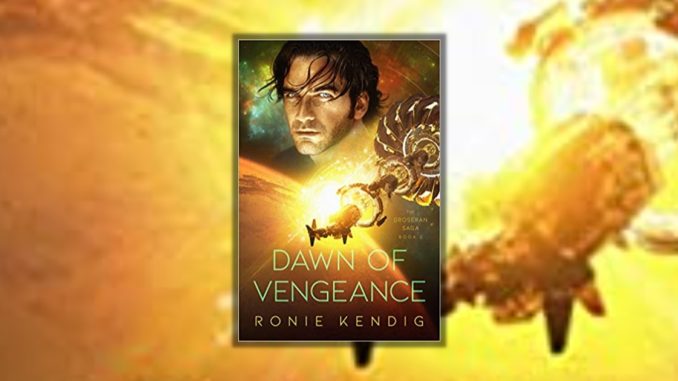
Also by this author: Storm Rising, Kings Falling, Dawn of Vengeance, Brand of Light, Storm Rising, Kings Falling, Soul Raging
Series: Droseran Saga #2
Published by Enclave Publishing on September 14, 2021
Genres: Fiction, Christian, Speculative, Thriller
Buy on Amazon
Goodreads

A haunting prophecy upended his identity. Now it demands his life.
Once a formidable bounty hunter, Marco Dusan is plagued by insecurity as he tours the realm he now rules. This quiet, backwater planet is not as untouched as he'd once thought. Evidence of collusion between Droseran factions and the powerful Symmachians with their forbidden technology litters his encounters. Worse, all signs indicate Xisya, the alien who tortured him, is still snatching Kynigos Brethren—but to what end?
Lance Corporal Eija Zacdari works hard to win a coveted place on the Symmachian hyperjump program, but instinct tells her their intel is flawed. Despite nearly failing the tests, she is assigned to the team-and lands in the middle of a bewildering conspiracy.
Haunted by a prophecy that promises pain and war, Marco forges alliances to protect the primitive world against Symmachia's devastating influence. But one truth becomes painfully clear: the biggest threat to their world may be much, much closer to home.
Before reading Dawn of Vengeance, I sat down and reread last year’s review of book one in the Droseran Saga, Brand of Light. I’m in a bit of a conundrum when it goes to Ronie’s writing because, while I loved a lot of her early work (Quiet Professionals, Operation Zulu Redemption, etc.) I haven’t felt the same about her recent stuff. Part of it in a change in genre. Book of the Wars trilogy was apocalyptic. Abiassa’s Fire and the Droseran Saga are space operas. With the genre change comes a change in writing style, pacing, characterization, and other elements that typified Kendig’s early work in her “RapidFire Fiction” catchphrase.
The Droseran Saga is anything but rapid fire. In my review of Brand of Light, I noted that Kendig allows her story to get bogged down with invented language, difficult fantasy names, and a vast panoply of characters. She mistakes info-dumping for world-building and readers are left to figure out a fully-realized world pretty much on their own. That continues in Dawn of Vengeance, though you do have the context of the first book to help you out. Nonetheless, some of the naming conventions end up a bit overwhelming.
For example, all of the following are characters or people groups mentioned in the book: Kakuzo, Kareh, Kavah, Kederac, Keril, Kersei, Khatriza, Kita, Krissos, Kynigos, Kyria. There’s also Milek, Malika, Mnason, Martiza, Marco, Maur, Mavridis, and Myles; along with Echion, Edrian, Edvian, Eija, and Elek. Combine this with the fact that some characters are referred to by multiple names—Achilus/Dusan/Marco, Mavridis/Ixion—and the whole thing is bit of a headache. It’s a testament to Kendig’s writing prowess that she manages to keep it all straight. I couldn’t.
Kendig’s language conventions aren’t limited to her character and place names. She also uses fantasy terms for abilities and items both normal and fantastical. When one character uses—for lack of a better term—their advanced sense of smell to track, we get a paragraph like this:
Following the efflux, he jogged, avoiding barrels. He zigzagged down alleys and through buildings for quicker movement. The path ended in a field beyond a dozen new Signatures and the ragged edge of the city. He passed, anak’ing the panicked efflux and an unusual fetor.
It slows down the story, needlessly complicating it. Stripped down to its basics, Dawn of Vengeance is fairly straightforward. Kendig wants to make the story more complex—provided a deep and nuanced, fully-realized world. Instead, she makes the story more complicated—making the simple story difficult to follow through her use of language. It’s a poor substitute.
Beyond this, the story’s really lags in the first third or so of the novel. It’s missing the action that characterized Brand of Light and made it readable. The pace does pick up as the story moves along, but by then—for me—it was too late to get settled into the story and follow it.
I’m in the minority when it comes to Kendig’s work. At the time of writing this review, Dawn of Vengeance boasts 118 four and five-star reviews on Goodreads, almost all of them with effusive praise. I don’t expect Kendig to change because, why would she? She has her audience eating out of her hand.
